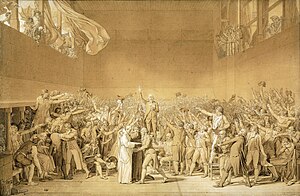Ballhaus Oath

In the Ballhaus oath ( French : serment du Jeu de paume , German: "Oath in the ball sports hall " ( Jeu de Paume = forerunner of tennis)) of June 20, 1789, the members of the third estate of the French General Estates in Versailles did not vow to part before they gave France a constitution . The oath was made in a makeshift meeting room, the Ball Sports Hall in Versailles , and was one of the decisive events at the beginning of the French Revolution .
prehistory
To resolve a serious financial crisis in the state, King Louis XVI. convened the Estates General, which met in May 1789 for the first time in 175 years.
In accordance with the customs of the Estates General, the collective votes of the three Estates - clergy, nobility, third estate - were given equal weight. The representatives of the Third Estate, who had previously managed to have twice the number of representatives, now claimed to introduce a new voting mode - counting by head - which would have increased their voting weight accordingly. They justified this with the fact that they represented around 98 percent of the population.
After the applications of the Third Estate had been rejected several times, its representatives declared themselves to be the National Assembly on June 17th . In doing so, they claimed to represent the entire French nation. To prevent further meetings of the delegates, the king ordered the closure of their meeting room in the Palace of Versailles . The pretext was given that craftsmen should prepare the hall for a joint conference of all three stands.
The vow
On June 20, 1789, the members of the National Assembly, which in the meantime had also been joined by some representatives of the first class clergy , went to the Salle du Jeu de Paume in Versailles. There they swore "never to part until the state has a constitution [...] and only to give way to the power of bayonets". With this oath they declared themselves a constituent assembly . The ball house oath was read at the meeting by Jean-Sylvain Bailly . On May 5, 1789, he had been elected President of an assembly that he had officially titled the National Assembly Assemblée Nationale on June 17 .
consequences
The king finally gave in to the pressure on June 27, 1789 and allowed the deputies to meet to represent the nation instead of the Estates-General. On July 9, 1789, the members of the 3rd and many others of the 1st and 2nd estates formed the constituent national assembly , in which voting was no longer based on estates but on heads. Since the king's subsequent approval only came about under pressure, the Ballhaus oath - according to the declaration of June 17 - is considered a second revolutionary step that was no longer carried out within the framework of the ancien régime . The path taken in this way ultimately led to the overthrow of the monarchy.
Web links
Individual evidence
- ↑ a b c The French Revolution. Retrieved May 15, 2013 .
- ↑ Ballhausschwur on arte.de. (No longer available online.) Archived from the original on June 24, 2013 ; Retrieved May 15, 2013 .
- ↑ The oath. Retrieved May 15, 2013 .
- ^ Lars Schneider: Bailly, JS short biogram. historicum, December 22, 2005, accessed on September 2, 2018 (German).
